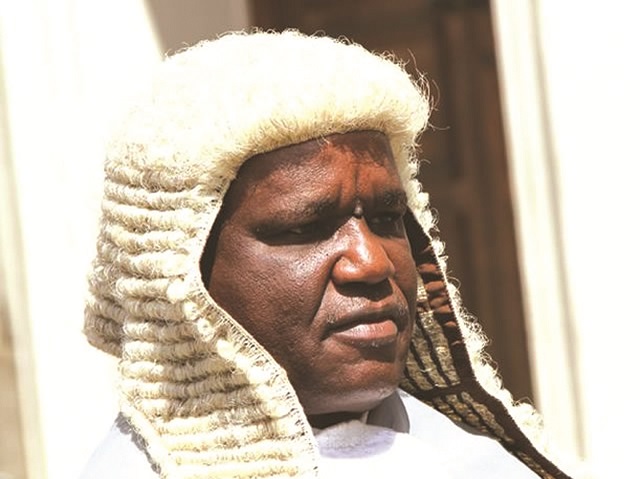By Gift Phiri
President Robert Mugabe, wily as ever, has once again run rings around brawling Zanu PF factions over the appointment of the country’s new chief justice — after he apparently picked the highly-regarded jurist, Luke Malaba, to succeed Justice Godfrey Chidyausiku who retired from the bench at the end of last month.
 Well-placed sources told the Daily News yesterday that Mugabe would not only follow the current judiciary hierarchy in making the critical appointment, but would also take into consideration the need “to manage” factions in his warring ruling Zanu PF.
Well-placed sources told the Daily News yesterday that Mugabe would not only follow the current judiciary hierarchy in making the critical appointment, but would also take into consideration the need “to manage” factions in his warring ruling Zanu PF.
The battle to appoint Chidyausiku’s successor had taken an ugly turn over the past few months as rival Zanu PF camps fought to install a candidate acceptable to their respective factions.
The two major Zanu PF factions — the Generation 40 (G40) group which is rabidly opposed to Vice President Emmerson Mnangagwa succeeding Mugabe, and Team Lacoste (the VP’s allies) — apparently saw the new chief justice position as a key cog in the wheel in the succession war, in case the thorny issue reached the courts one day.
Presidential spokesperson George Charamba would neither deny nor confirm yesterday that Malaba — who turns 66 in May, and has been acting chief justice since Chidyausiku retired — would soon be confirmed in the position.
“Sadly, I can’t confirm because I haven’t been briefed on it by my principal. Your best bet is to check with the Justice ministry. Check with (Justice permanent secretary, Virginia) Mabhiza or the minister (Mnangagwa),” was all Charamba would say.
Mabhiza could not be reached as she was said to be tied up in meetings.
However, authoritative sources confirmed to the Daily News that the appointment of Malaba, who scored the highest points during the public interviews that were held in December last year to select Chidyausiku’s successor, was a fait accompli (done deal).
“He (Mugabe) went for hierarchy, and was also guided by the top marks earned by Malaba during the interviews. But more importantly, Malaba was seen as a safe candidate whose appointment would not cause friction.
“He performed well during interviews, has the requisite experience and was seen as a consummate professional who will not be swayed by politics,” one of the sources said.
Three candidates — Constitutional Court judge Paddington Garwe, Judicial Services Commission (JSC) secretary Rita Makarau and Malaba — were recently interviewed for the post, with a fourth candidate, High Court Judge President George Chiweshe pulling out of the race at the last minute.
Malaba got the highest score of 91 percent, followed by Makarau at 90 percent and Garwe came third with 52 percent.
Both analysts and the opposition said yesterday if the speculation was correct that Malaba would succeed Chidyausiku, this was laudable as they saw him as a “fair, outstanding and most impressive” jurist.
MDC spokesperson Obert Gutu, who is also a lawyer, said Malaba’s appointment would be well-deserved.
“It is not a surprise at all that he distinguished himself at the chief justice interviews that were held recently. Thus, to us in the legal profession, it is only befitting that Justice Malaba be appointed as Zimbabwe’s new chief justice. He more than deserves that position,” he said.
“That news will be well-received and will restore confidence in the esteemed office of the chief justice which has been tainted by the political mudslinging in the selection process,” weighed in another lawyer Kudzayi Kadzere.
However, rights lawyer Dewa Mavhinga, while congratulating Malaba, also warned against the politicisation of his appointment.
“He should also promptly assert the independence of the judiciary to deliver its constitutional mandate, without undue influence from any quarters,” Mavhinga told the Daily News.
“The judiciary must not be a captured institution beholden to a party faction, but an autonomous pillar of State that interprets the law without fear or favour,” he added.
Meanwhile, Parliament is still in the process of amending the country’s new Constitution to restore the sole responsibility of appointing the chief justice and other senior judges to Mugabe, as previously obtained in the old constitution.
The new Constitution, which was produced by an inter-party parliamentary committee in 2013, curbed presidential powers by requiring the JSC to conduct public interviews for the position of chief justice. Daily News






